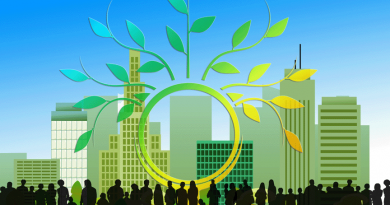The social dimension of the climate transition
Mehtap Akgüç, Kalina Arabadjieva and Béla Galgóczi are Researchers at the European Trade Union Institute
As well as the inclusion of the notion of just transition into the preamble of the 2015 Paris Agreement, and then in the Glasgow Climate Pact, employment and distributional aspects of climate change mitigation have been recognized at the highest policy level of European union. This can be seen as a modest but important achievement of a several decades-long campaign for a just transition by the labour movement.
The announcement of the European Green Deal (EGD)1 in 2019 had already included pledges to ‘leave no-one behind.’ The Just Transition Mechanism2 and the proposed Social Climate Fund3 are some of the main EU measures announced to date intended to mitigate the impact of the transition on the most affected regions, vulnerable individuals and businesses.
The Council Recommendation on the social and labour aspects of the climate transition, which is not legally binding, has also provided guidance to member states on how to ensure that the green transition takes place in a just and fair way.
This is a huge challenge that spans across many questions, such as the distributional effects of decarbonization policies, jobs losses and employment transitions, the protection of basic social rights and inclusion of citizens in decision-making, to name but a few.
By no means should this instrument be seen as a substitute for strengthening the social dimension of EU legislative and policy measures on climate change. Nor should it give reason to lower climate ambitions – a ‘just transition’ does not mean ‘slow transition.’
A just transition for the EU can only be ‘just’ in a true sense if it goes with maximum climate ambition, particularly given Europe’s historical debt to low carbon footprint developing countries. With this in mind, we outline some of the key labour and social effects of the EU’s Fit for 55 climate package4 on the EU population and potential responses that the recommendation should consider.
Employment effects
Climate policies are having and will continue to have a major effect on the world of work. Millions of new jobs are being created in the transition to a net zero carbon economy, but a large number of jobs will also disappear.
The majority of jobs will go through a fundamental transformation. This unprecedented wave of restructuring will have unequal effects on many fronts, including skills, gender, age, economic activity and region. Sectoral differences are particularly high.
The energy and automotive sectors will be the ones most affected by the decarbonisation drive from climate and environmental regulations at European and national levels. While coal has no future and coal-dependent jobs will be gone, the automobile does have one, albeit in quite a different form from the one we know.
In the coal-based power sector the majority of currently existing jobs will disappear in a decade and the regional effects will be harsh5, as over 90% of coal jobs are concentrated in ten NUTS 2 regions, four of them in Poland.
With a more than 5% share of total European employment, the automotive sector is a key employer. For the car industry, the demise of the combustion engine and the electrification of the powertrain will require the development of new competences, skills and forms of work organisation.
These will have a substantial impact on the comparative advantages held by certain nations and manufacturers6. The renewable energy sector, construction and low-carbon infrastructure are expected to deliver most of the job creation7.
However, transitional policies should consider the local dimensions of the transition – the places where jobs are lost and created are not necessarily the same and relocating labour is not straightforward.
Inclusive and comprehensive social and economic policies are essential to securing social justice, resilience and sustainability
Jobs and skills
Climate change policy will have a major impact on jobs, their skill contents and how they are performed. The transition will come along with increasing demand for skills in the renewable and cleaner energy sector, energy and resource efficiency, digital competences, STEM knowledge to trigger innovation and breakthrough technology, greener construction methods, city planning and design, technical competences in adaptation, waste management, maintenance and repair technologies to reduce resource exigency as well as boost circular economy practices, to name a few8.
To match the rising demand in specific skills and competences for the green transition, training programs and education curricula need to be adapted to the needs of the labour market. Public sector and businesses could cooperate to adapt the training and education programs.
Training, reskilling and upskilling should be made available to the wider workforce and in a flexible format to the extent possible (eg. online or flexible hours) to ensure that nobody is left behind and attract new talents to green jobs, avoiding skill gaps.
Working time and work conditions will also be impacted by climate change and environmental degradation. For example, extreme and frequent heatwaves will necessitate reorganization of working time in key sectors or equipment of air conditioners will be needed to provide appropriate health and care services in regions experiencing adverse climate effects9.
Distributional effects
Effective climate policies can only be based on a comprehensive policy framework that include regulation, standards, taxes and market mechanisms in a balanced manner. While market mechanisms – such as the EU’s Emissions Trading Scheme10 – that set price signals to market actors are one important element of this in changing investment and behavioural patterns, they can only have the desired effects in well-functioning markets, but current energy markets are far from that.
Moreover, the signals themselves have significant regressive distributional effects, disproportionally affecting low-income households, for whom fuel and transport consumption make up a higher share of their income11.
Poorer households also have less capacity to change, as while low-carbon products (electric vehicles, rooftop solar panels, and so on) may have low operating costs, they tend to have high, upfront capital costs – presenting a hurdle for households with little access to cheap capital.
Certain vulnerable groups are likely to be affected more than others during the transition. For example, climate change induces gendered effects as men are disproportionately employed in polluting sectors.
This can imply mitigating effects for women: while it can result in overall poverty for the household as men lose jobs, it might also encourage women to enter into the labour force for paid employment – yet with concerns about job quality – to support household income.
However, there is also wide evidence pointing to disproportionate vulnerabilities – such as having fewer resources at disposal, reduced access to education as well as being frequently excluded from information and decision-making processes – faced by women during green transition12. Just transition must mean also empowering women and addressing these structural inequalities.
Another group experiencing vulnerabilities is migrants. For one, most of the foreign-born workers are employed in relatively low-paying and polluting sectors and have no or only limited access to training to upskill towards transition to low-carbon economy13.
The other aspect relates to the future – both internal and international – migratory movements towards Europe as a result of climate emergency.
Both of these aspects point to the importance of targeted social and labour market policies to manage flows, ensure successful socioeconomic integration and just transition for everyone including migrants.
This would contribute to global climate justice as the ones most adversely impacted by climate change are not the main contributors to it.
Fundamental rights
The environmental, social and economic effects of climate change and related mitigation policies threaten the enjoyment of fundamental human rights14. These include basic social and economic rights, widely recognised in international and European human rights instruments and national constitutions15. They constitute entitlements to basic conditions for a decent human life, without which it is impossible to speak of a ‘just’ transition.
Both the distributional and employment consequences of climate change policies could affect various basic rights such as the right to work, the right to just working conditions, the rights to an adequate standard of living and to protection from poverty and social exclusion.
As the burdens of the transition fall disproportionately on those who are already most vulnerable, disparate impacts of policies along the axes of gender, ethnicity, migrant status, disability or other protected status could impinge on the right to equality and non-discrimination.
Threats to fundamental rights in global supply chains arise in the context of delivering the resources and technology necessary for decarbonisation16.
At the same time, fundamental rights can provide a normative framework for the basic elements – necessary but not sufficient – of just transition policy. Aside from the rights mentioned above, ensuring respect for rights to vocational training, fair remuneration, social security, equal opportunities, and collective bargaining – and others – could constitute the foundations of a strategy to address the impacts of the green transition on workers and citizens more broadly.
Discussion of fundamental rights is, however, largely absent from the European Green Deal and Fit for 55 packages. Reference is made to the European Pillar of Social Rights17, a list of 20 principles without binding legal effect. There is no mention of the EU’s own Charter of Fundamental Rights18, nor other international legal norms.
The Recommendation could be an opportunity to strengthen the link between the just transition agenda and long-standing frameworks for the protection of fundamental labour and social rights, such as the European Social Charter or the core Conventions of the International Labour Organization.
Citizen participation
Climate protest movements such as Fridays for Future, as well as the tens of thousands of people who took to the streets during COP26 make clear that citizens want to have their voices heard when it comes to climate change.
A key challenge for a procedurally fair green transition is to ensure that the public, and especially the most affected communities and citizens, have an opportunity to participate in decision-making.
Participation is a means to empowering and fostering cooperation with affected communities, and contributing to better outcomes and increased democratic legitimacy. In the labour context, this means meaningful participation by workers and social dialogue.
Climate citizen assemblies, convened in France, the UK and some other European countries over the last years are gaining popularity as a forum for public debate on climate change. The on-going Conference on the Future of Europe includes a panel on climate change, too.
But simply providing a forum is not enough – decision-makers also have to listen. Transparency, information and capacity-building are crucial to meaningful involvement, as are active steps to include marginalised groups and to ensure diversity across factors such as gender, ethnicity, age, socio-economic status or geographic location.
The way forward
Getting climate change under control is in the interest of humanity, the unprecedented restructuring process economies need to go through in a few decades to reach net zero emissions is policy driven. These policies will have differential effects on people with different socio-economic characteristics, and policymakers have a dedicated responsibility to address these.
A just transition means that addressing both the employment and distributional effects of a transition to net zero should be an integral part of the package and not supplementary corrective measures.
The EGD has recognised this, but in practice social and employment policy initiatives have remained fragmented and additional. This shortcoming has become very clear with the announcement of the Fit for 55 package in July 2021.
Europe now has a Just Transition Fund with limited resources, dedicated mostly to helping coal regions manage the social and employment effects of coal phase-out. This is very important but reaches a small fraction of people affected by decarbonisation.
The newly announced Social Climate Fund has a very specific target, namely to fend off the detrimental distributional effects of a new emissions trading system for buildings and transport, but even for that it may not be enough19. Sectors that are highly affected, the automotive sector and energy intensive industries do not have dedicated instruments and a fund.
European-level labour market and social policy initiatives should provide guidance to member states to manage change, and the proposed Council Recommendation is one way of doing so.
In this context, ‘leaving no-one behind’ should be more than a slogan and translate into concrete measures. Contrary to the declarations, just transition policies are not yet an integral part of the European Green Deal agenda and of the more concrete Fit for 55 policy package.
A comprehensive just transition policy framework should include the following elements:
1. Support for workers in the transition to new jobs with measures targeted to specific sectors (automobile, energy intensive industries, etc.) tailored to national and regional specifics.
2. Deal with the distributional effects of climate policies with targeted measures against energy and transport poverty, supporting and facilitating the affordability and accessibility of low carbon technologies to lower income households (retrofitting of buildings, access to renewable energy, vehicle fleet change, developing public transport).
3. Regional development initiatives to help carbon intensive regions towards a sustainable low-carbon economy.
4. Promote social dialogue and stakeholder involvement at all levels (EU, national, regional and plant level) in managing change towards a zero-carbon economy, including meaningful involvement by citizens.
5. Make sure that newly created green jobs are also good jobs in terms of contract type, social security, wages and working conditions in line with the ILO decent work agenda.
Today a large part of the workforce is in fear of change, a concern that is justified in a labour market environment characterised by increasing precariousness.
As long as ‘change’ remains fearful, the biggest transformation since the industrial revolution ahead of us cannot succeed. Inclusive and comprehensive social and economic policies are therefore essential to securing social justice, resilience and sustainability.
Endnotes
1. Available here.
2. Available here.
3. Available here.
4. Available here.
5. Alves et al 2018, EU coal regions: opportunities and challenges ahead, Publications Office of the European Union, Luxembourg, available here. See also Galgoczi, 2018, Phasing out coal – a just transition approach, ETUI Working Paper 2019.04, available here.
6. Bauer, Rieder and Hermann, 2020, Employment 2030: Effects of electric mobility and digitalisation on the quality and quantity of employment at Volkswagen, Fraunhofer Institute for Industrial Engineering IAO, Stuttgart, available here.
7. JRC report Asikainen at el 2021, The Future of Jobs is Green, available here.
8. See the recent skills forecasts by Cedefop, 2021, Digital, greener and more resilient, available here; or the JRC report 2021, available here.
9. Narocki, 2021, Heatwaves as occupational hazard: The impact of heat and heatwaves on workers’ health, safety and wellbeing and social inequalities, ETUI Report 2021.06, available here.
10. Consolidated text available here.
11. See eg. Cabrita, Demetriades and Fóti, 2021, Distributional impacts of climate policies in Europe, Eurofound, Publications Office of the European Union, Luxembourg, available here.
12. See UN WomenWatch, Fact Sheet: Women, Gender Equality and Climate Change, available here.
13. See eg. https://www.ethicaltrade.org/issues/migrant-workers or https://www.ilo.org/global/topics/labour-migration/climate-change/green-jobs/lang–en/index.htm
14. See eg. UNEP, 2015, Climate Change and Human Rights, available here.
15. Eg. UN International Covenant on Economic, Social and Cultural Rights, the Council of Europe’s European Social Charter, the Charter of Fundamental Rights of the EU and conventions of the International Labour Organization.
16. Watkins, ‘Mining holds the key to a green future – no wonder human rights activists are worries’, The Guardian, 27 June 2021.
17. Available here.
18. Available here.
19. Galgoczi, ‘Is Europe socially fit for the ‘Fit for 55’ package?’, Social Europe, 19 July 2021.




